Discover the best places to live in Thailand for expats
If you’re considering a move to Thailand or simply dreaming about a life in this vibrant country, you are not alone. Thailand has long been a favourite among expats, especially Brits, thanks to its warm climate, rich culture and stunning landscapes. As one of southeast Asia's most popular destinations for expatriates, Thailand stands out for its lifestyle, affordability and regional significance.
In this guide, we will delve into some of the best places to live in Thailand, highlighting what each location offers and why they stand out for expats.
Why Thailand is a top choice for expats?
Thailand stands out as one of Southeast Asia’s most popular expat destinations and it’s easy to see why. The country offers a captivating mix of traditional Thai culture and all the modern conveniences you could wish for. Many expats are drawn to Thailand’s vibrant nightlife, rich history and the endless array of cultural events that take place throughout the year. Whether you’re exploring ancient temples, enjoying the buzz of local markets or relaxing on a quiet beach, you’ll find that Thailand’s stunning natural beauty and warm climate create the perfect backdrop for a new adventure.
From the peaceful lifestyle in Chiang Mai to the all the excitement of Bangkok’s city life, there’s a place in Thailand to suit every personality. The affordable cost of living means you can enjoy a high quality of life without breaking the bank, while the country’s friendly locals and welcoming expat communities make it easy to settle in. If you’re looking for a destination that combines rich culture, natural beauty and modern amenities, Thailand is an unbeatable choice for living in Southeast Asia.
1. Chiang Mai: The cultural capital
Chiang Mai, nestled in the mountains of Northern Thailand, is renowned for its rich history, beautiful temples and vibrant arts scene. This city presents the perfect blend of culture, comfort and affordability, making it one of the top places to live in Thailand. Chiang Mai is consistently ranked among Thailand's most affordable cities for expats.
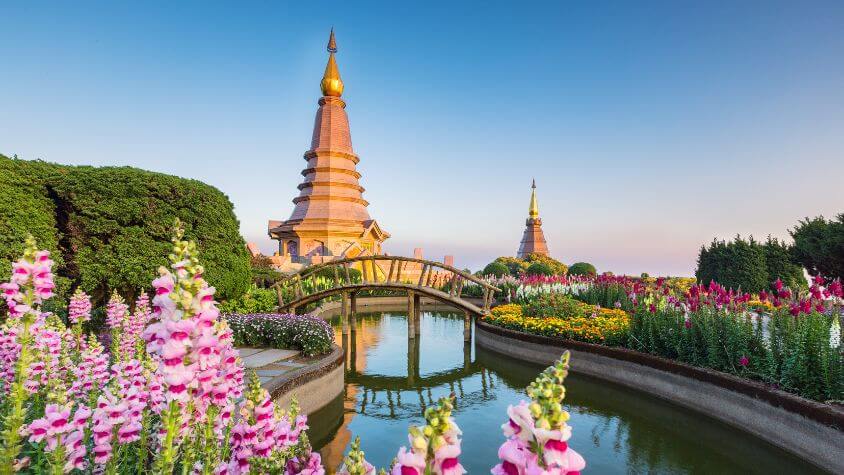
What does Chiang Mai have to offer:
Cost of living: Chiang Mai is notably affordable. You can live comfortably on around 30,000 to 50,000 THB (£750 - £1,250) per month. This includes housing, food and leisure activities, allowing you to enjoy life without breaking the bank.
Cultural experience: The city is a treasure trove of tradition, hosting numerous festivals and cultural events throughout the year. Ancient temples, like Wat Phra That Doi Suthep, invite you to explore some of Thailand’s most spiritual heritage.
Amenities and lifestyle: Chiang Mai is famous for its abundance of coffee shops, which are especially popular with digital nomads and expats seeking a comfortable work and social environment.
Safety and security: It’s considered one of the safest cities in Thailand, making it ideal for families and retirees.
Expat community: A significant number of Brits reside here, making it a vibrant expat scene. Regular meet ups and social events provide plenty of opportunities to build new relationships. Chiang Mai is also home to several international schools, making it suitable for expat families.
Chiang Mai, as Thailand's second largest city, occasionally experiences poor air quality during the burning season, so monitoring air quality is important for residents.
2. Bangkok: The bustling metropolis
If you thrive in a fast-paced environment, Bangkok is the place for you. As Thailand's largest city and economic hub, it offers an exciting blend of traditional and modern living for expats, solidifying its reputation as one of the best places to live in Thailand.
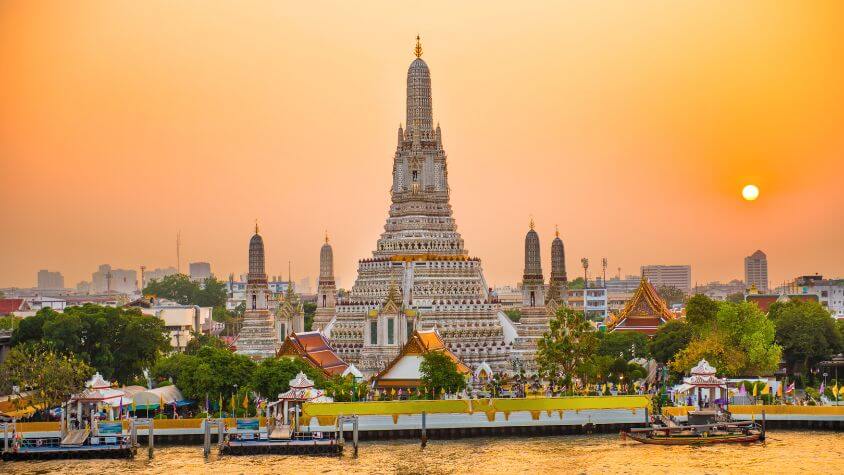
Why is Bangkok such a great place to live:
Career opportunities: Bangkok is a hub for international business, making it an attractive place to live for professionals from various sectors. Expats can find a wide range of job opportunities in fields like technology, education and hospitality. The tourism industry also plays a significant role in Bangkok's economy, providing numerous jobs and supporting local businesses.
Lifestyle: With an abundance of restaurants, shopping malls and entertainment options, Bangkok is a city that never sleeps. Whether you prefer street food or fine dining, there’s something in this city to suit everyone. This nightlife is equally lively, offering a great range of bars and live music venues.
Transportation: While traffic can be hectic, Bangkok’s public transport system, including the BTS Skytrain and MTR subway, makes commuting accessible and affordable for everyone. The city is also served by a major international airport with frequent international flights, ensuring excellent connectivity for expats and travelers.
Cultural experience: This city is rich in cultural landmarks, such as the Grand Place and Wat Pho. These attractions allow expats to immerse themselves in Thailand’s history while still enjoying the modern city lifestyle.
Family and education: Bangkok offers a wide range of international schools, making it a popular choice for expat families. However, international school fees are an important consideration when planning your move.
3. Phuket: The island paradise
For those who dream of beach living, Phuket is Thailand’s largest island and a popular destination among expats. Its stunning, long stretches of sandy beaches and vibrant nightlife make it the perfect destination for those seeking a tropical lifestyle.
Phuket Town offers a more authentic, less crowded experience, with convenient amenities like shopping malls and international schools, making it ideal for expats seeking a traditional yet comfortable lifestyle.
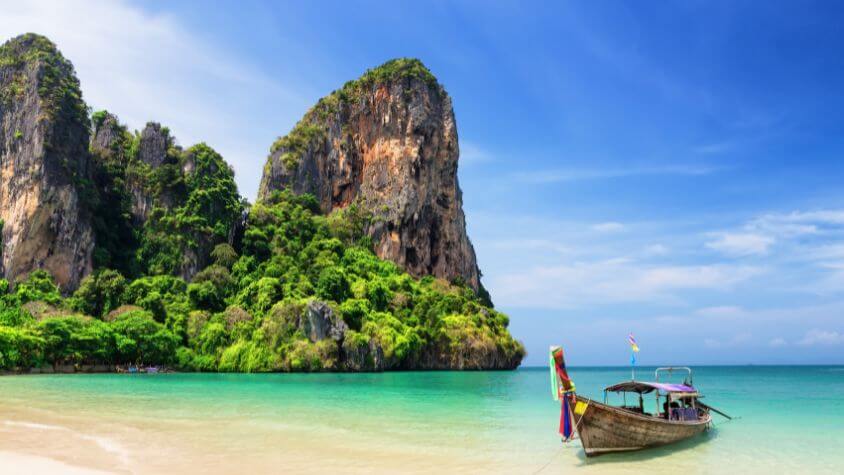
Why you should consider living in Phuket:
Natural beauty: With crystal-clear waters and soft sands, Phuket is a paradise for beach lovers. Whether you’re into water sports, sunbathing or exploring local nightlife, Phuket has it all.
Expat community: The island is home to a large expat population, which will make it easier for you to form relationships. There are various clubs and groups that cater to different interests, ensuring you feel at home.
Cost of living: Living in Phuket can be more expensive than Chiang Mai or Bangkok, but you can still live well on 50,000 to 70,000 THB (£1,250 to £1,750) monthly. Although living costs may be higher, many expats find the lifestyle well worth the investment. There are beautiful villas and beachfront properties available, often at reasonable rates if you look in the right place. Phuket also offers high-quality healthcare at affordable prices.
Attractions and activities: Beyond the beautiful beaches, Phuket offers a range of activities, from cultural shows to island-hopping tours.
Phuket is served by an international airport, providing easy access to international flights for residents and visitors.
The island is home to several international schools, making it a great choice for expat families.
The tourism industry is a major driver of Phuket's development and infrastructure, supporting local businesses and enhancing the quality of life for residents.
4. Hua Hin: The relaxed coastal town
If you prefer a quieter beach town, Hua Hin might be your perfect match. This lively seaside town is also a popular seaside resort town, favoured by retirees and families alike, making it one of the best places to live in Thailand for those seeking a peaceful lifestyle.
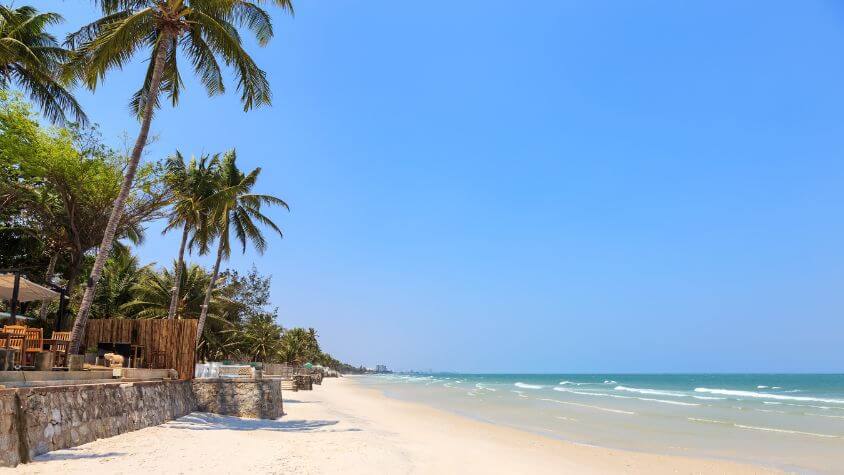
What makes Hua Hin so special:
Family-friendly: Hua Hin is known for its excellent schools and healthcare facilities, making it the ideal place to live for families. The town’s slower pace is also attractive for those looking to raise children overseas or enjoy a relaxed retirement.
Safety and security: Consistently ranked as one of the safest places to live in Thailand, Hua Hin offers a low crime rate and a welcoming local community, allowing expats to feel secure.
Cost of living: You can enjoy a comfortable lifestyle on around 30,000 - 50,000 THBG (£750 to £1,250) per month. This town offers a variety of affordable housing options and reasonably priced dining.
Activities and amenities: From vibrant local markets to beautiful golf courses, Hua Hin is jam packed with activities to keep you busy. Its long stretches of sandy beaches are a major attraction, offering scenic beauty and plenty of opportunities for water sports and relaxation. Its close proximity to Bangkok is also handy and makes it easy to explore more of Thailand - your new home.
5. Koh Samui: The tropical retreat
Koh Samui strikes the perfect balance between luxury and laid-back living. This island is ideal for those who wish to indulge in a high class lifestyle, whilst being surrounded by stunning natural beauty, making it one of the top places to live in Thailand.
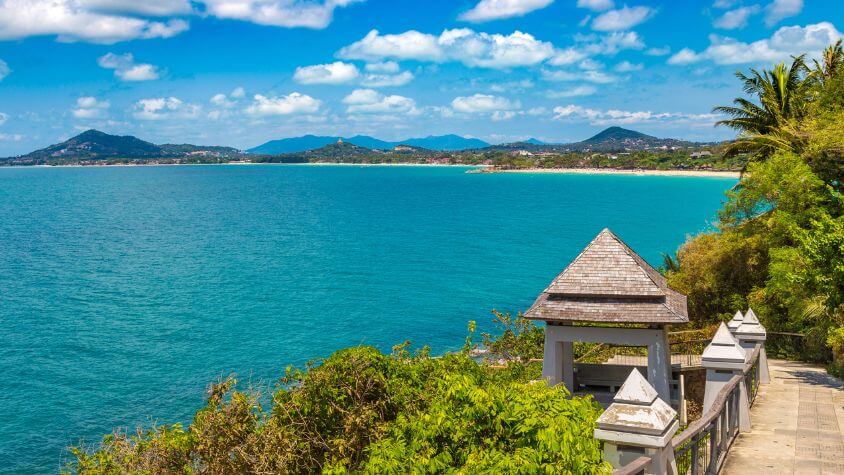
Why should you choose to live in Koh Samui:
Tropical paradise: Koh Samui is famous for its breathtaking beaches and incredible landscapes. Expats can enjoy a range of outdoor activities, from diving to snorkelling to hiking in scenic rainforests. The island’s beach lifestyle offers easy access to sandy shores, warm weather and a variety of outdoor activities, making it especially attractive for those seeking a relaxed yet comfortable environment.
Lifestyle: As mentioned, the island is known for high end lifestyle, with residents having access to a variety of upmarket accommodations and amenities. Many expats reside in beautiful villas or gated communities, enjoying a lifestyle that is exclusive yet welcoming.
Amenities: Koh Samui features a wide selection of coffee shops that are popular with expats and digital nomads, providing familiar comforts and social spaces.
Expat community: Koh Samui’s significant expat population means there are plenty of clubs and events tailored to people like you. Networking and socialising is very easy here, with activities catering to diverse interests.
Cultural experience: While Koh Samui attracts many tourists, it retains its cultural charm. Temples, local markets and traditional festivals provide opportunities for expats to immerse themselves in the Thai culture.
Convenience: The island offers easy access to key amenities and transportation options, ensuring residents can conveniently reach important destinations and services.
As you explore some of the best places to live in Thailand, you may have some questions about what life is really like as an expat in Thailand. From bustling Bangkok to serene Hua Hin, each destination offers its unique charm and community. If you’re considering moving to Thailand, it’s important to understand some key factors when choosing where to call home.
In the following FAQs, we’ll address some of the most common questions expats ask when choosing the best place to live in Thailand. This information should help you navigate your options and make an informed decision about your future in Thailand.
Cost of living in Thailand: What to expect in 2025
Living in Thailand continues to be an affordable option for expats, especially when compared to many Western countries. In 2025, the cost of living remains attractive, with average monthly rent for a one-bedroom apartment in the city center ranging from 8,000 to 15,000 THB (about £250–£450 USD). If you’re looking for more space, a three-bedroom house in a suburban area typically costs between 15,000 and 30,000 THB (£450–£900 USD) per month.
Daily expenses are also budget-friendly. Enjoying local food at street food stalls or small restaurants usually costs just 100–200 THB (£3–£6 USD) per meal. While western food and imported products are available in most Thai cities, they do come at a premium. Overall, housing costs and daily expenses are low enough that most expats find they can live comfortably and enjoy a great lifestyle, whether they’re in the heart of the city or a quieter neighborhood.
Healthcare and safety: Staying well and secure
Thailand is well-regarded for its excellent healthcare facilities, particularly in major cities like Chiang Mai. Expats have access to modern hospitals and clinics staffed by English-speaking doctors, offering everything from routine check-ups to specialist care and emergency treatment. The country’s healthcare system is efficient and affordable, making it a reassuring choice for those living in Thailand.
When it comes to safety, Thailand is generally considered a secure place to live. Cities like Chiang Mai are known for their low crime rates and welcoming communities, which is why many expats choose to settle there. Emergency services are reliable, with a dedicated hotline and ambulance network available throughout the country. As with any destination, it’s wise to take standard precautions to protect yourself and your belongings, but overall, Thailand offers a safe and healthy environment for expats.
Visa requirements and banking: Navigating the essentials
If you plan to live in Thailand, understanding the visa process is essential. There are several visa options available, including retirement, work and education visas, each with its own set of requirements. The application process can be detailed, so it’s important to research which visa best suits your situation and ensure you have all the necessary documentation.
Once you’ve secured your visa, opening a Thai bank account is the next step. Most expats choose reputable banks like Siam Commercial Bank, which offer a range of services for foreigners. To open an account, you’ll typically need to provide proof of identity, proof of address and a minimum deposit. Some banks may have additional requirements or restrictions for non-Thai residents, so it’s a good idea to check in advance. Having a local bank account makes managing your finances in Thailand much easier and is often required for things like renting property or receiving a salary from a Thai company.
Property and rentals: Finding your new home
Thailand offers a diverse range of property and rental options to suit every lifestyle and budget. Whether you’re looking for a modern apartment in the city center, a spacious house in the suburbs or a traditional home in a quieter area, you’ll find plenty of choices. Rental prices vary depending on location, size and amenities, with city center properties generally commanding higher rates than those in outlying areas.
Expats can search for rental properties through real estate agents, online portals or local classifieds. If you’re considering buying property, it’s important to be aware of the regulations regarding foreign ownership—while it’s possible to own a condo, there are restrictions on land ownership for non-Thais. Despite these rules, Thailand remains an attractive place to find affordable housing options, from budget-friendly apartments to more luxurious lifestyle choices like beachfront villas or gated communities. With a little research, you’ll be able to find the perfect home to suit your needs and enjoy all the amenities that living in Thailand has to offer.
FAQs - Moving to Thailand
1. What is the best city to live in Thailand?
It depends on your lifestyle. Bangkok is great for jobs and nightlife, Chiang Mai for affordable living and expat communities and Phuket or Krabi for beach life.
2. What is the cheapest city to live in Thailand?
Chiang Mai and Chiang Rai are considered some of the most affordable cities in the country, with lower rent and daily expenses compared to Bangkok or Phuket.
3. Is Thailand a good place for expats?
Yes. Thailand is popular with expats for its warm climate, affordability and lifestyle. Major cities have established expat communities, making it easier to settle in. Learning the Thai language is important for smoother integration and daily interactions. Thailand's tropical climate is also a major draw for many expats.
4. How much does it cost to live in Thailand per month?
On average, expats spend £700–£1,200 per month depending on city and lifestyle. Bangkok and Phuket are more expensive, while Chiang Mai and Isaan regions are cheaper. Affordable prices for housing, food and healthcare contribute to Thailand's appeal.
5. Which city in Thailand is best for digital nomads?
Chiang Mai is considered Thailand’s digital nomad capital, thanks to affordable living, co-working spaces and a vibrant expat scene.
6. Where do most foreigners live in Thailand?
Popular expat hubs include Bangkok, Chiang Mai, Phuket, Pattaya and Koh Samui. Each offers different lifestyle advantages and has a large expat community, making it easier for newcomers to settle in.
7. Can Pickfords help with moving to Thailand?
Yes, Pickfords provides international removals, shipping and customs assistance to make relocating to Thailand stress-free.
8. Where do most Brits live in Thailand?
Chiang Mai and Bangkok are among the most popular destinations for British expats. Chiang Mai’s relaxed atmosphere appeals to retirees, while Bangkok’s job market attracts younger professionals.
9. How much money is needed to live comfortably in Thailand?
You can live comfortably in Thailand on a budget of around 30,000 - 50,000 THB (£750 - £1,750) per month, but this depends on where you live and your lifestyle choices. This affordability is a major draw for those considering the best place to live in Thailand.
10. What is the safest city in Thailand?
Chiang Mai is renowned for being the safest city in Thailand, boasting low crime rates and a welcoming community. This makes it one of the top places to live in Thailand for those prioritising safety.
11. Where is the nicest place to live in Thailand?
This can be subjective, but the general consensus is that the cultural richness of Chiang Mai and the stunning beaches of Phuket and Koh Samui make them some of the nicest parts of Thailand. Thailand's tropical climate is also a significant attraction for many expats.
Thailand offers a great range of options for those looking to move to Thailand. Whether you’re drawn to the mountains of Chiang Mai, the vibrancy of Bangkok or the tranquility of Hua Hin, there’s a perfect destination waiting for you. Each location mentioned in this guide ranks among the top places to live in Thailand, providing unique advantages for expats.
At Pickfords, we understand that moving to Thailand can be both exciting and challenging. This is why we offer a range of comprehensive moving services tailored to your needs, ensuring a smooth transition to your new home in Thailand. From packing to shipping and customs clearance, our experienced team is here to support you every step of the way.